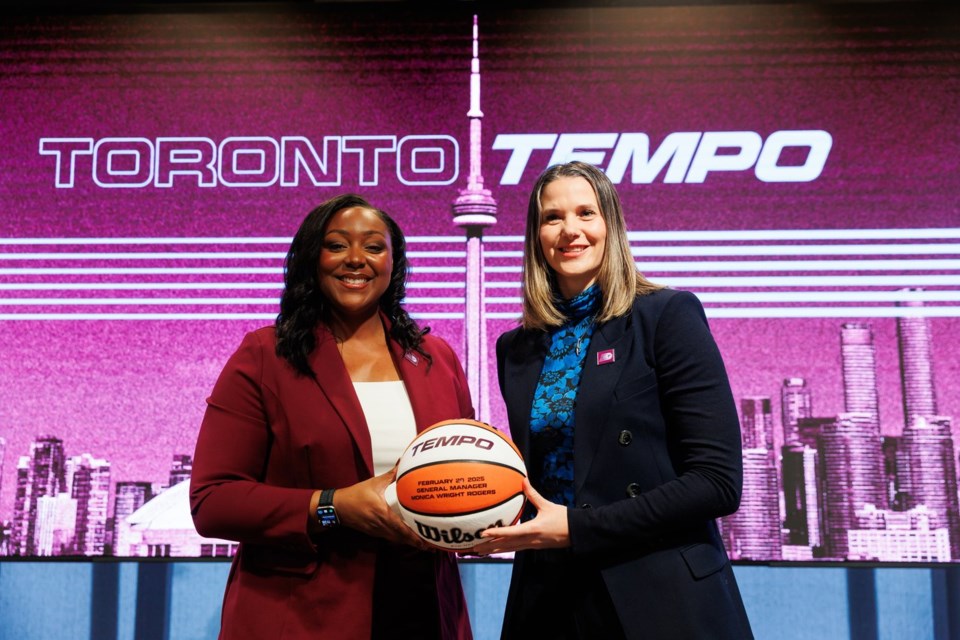TORONTO — New data on the explosive growth of women's sport in Canada underscores its rising popularity, but also reveals that its structural supports still lag behind.
Jessica Doherty, vice-president of strategy and growth at Torque Strategies, presented findings from a new national survey on Wednesday morning at the espnW Summit Canada at Toronto's Evergreen Brick Works. One of the study's main findings is that 60 per cent of Canadians believe perceptions of women's sport have improved over the past three years.
"It has been on quite a rocket ship and one of the things that feeds into that is just the growing visibility in it," said Doherty, noting that three professional women's sports properties have been launched in Canada in the past three years.
"I think when people see it more, then they're like, 'oh, yeah, this is a thing.' It becomes normalized, and therefore, other people think, 'Oh, it's OK for me to be a fan of women's sport.'"
Commissioned by Torque Strategies, in partnership with IMI, the report surveyed 2,000 people across a wide demographic spectrum that was representative of Canada's population. It found that 80 per cent of male respondents consider themselves fans of women's sport.
According to the report, 41 per cent of Canadians see women's sports as a national investment.
The surge in popularity across all genders was, in large part, thanks to the founding of the Professional Women's Hockey League, soccer's Northern Super League, and the announcement that the Women's National Basketball Association will expand into Toronto for the 2026 season.
However, the report also found that over 30 per cent of fans believe that investment is lacking across media, sponsorship and policy.
"The next step is to sustain that growth, right?" said Doherty. "You see leagues historically in the U.S. and there's been some stop and start leagues, so we want to find ways to keep the growth, keep the momentum and help sustain them.
"I think forums like this and research like this ... helps back up this excitement with real data that supports a business case."
Since the PWHL was founded in 2023, there has been a 45 per cent increase in female hockey registrations in Canada, a historic record for the sport.
Monica Wright Rogers, the new general manager of the WNBA's Toronto Tempo, was also a panellist at the espnW Conference. She said that she hopes the new women's basketball franchise will capture the imagination of young Canadian girls like the PWHL and NSL have.
"We want to inspire a generation to pick up a basketball and be a professional," said Wright Rogers, who played collegiately and in the WNBA before moving into coaching and was the Phoenix Mercury's assistant GM before signing on in Toronto. "If you're having fun at the sport, and you're young, and then you see women, professionally, living their lives, having fun and are good, that does something to a young person.
"I wouldn't be here if I didn't have the WNBA to aspire to, or the NWSL, or professional women putting their all on their playing field."
Hosted by ESPN's Sarah Spain, the third annual espnW Summit Canada had a dozen presentations.
Some of the panels included Torque Strategies and IMI's presentation on the growth of women's sport, Wright Rogers' panel on women leading professional sports organizations, a discussion of how to build better facilities for women's sports, and an introduction of some of the founders getting support from Toronto Metropolitan University's Future of Sport Lab.
"This year, you'll see it's a lot more about grassroots and infrastructure and investment, really trying to expand the conversation and broaden that," said Doherty during the lunch break. "That's what we hope to continue with, year on year, when it comes to the research.
"Our agency is very, very passionate about women's sport, as is IMI, so we are going to continue to follow up on the report, new releases, new ideas, new insights that will come out on a biannual basis."
This report by The Canadian Press was first published June 18, 2025.
John Chidley-Hill, The Canadian Press



